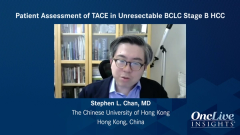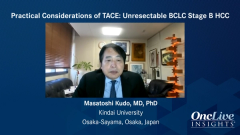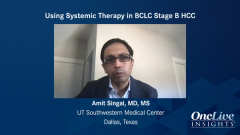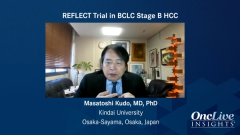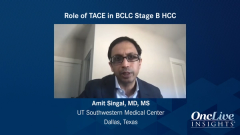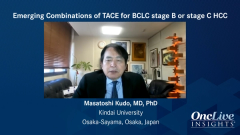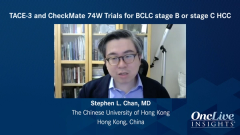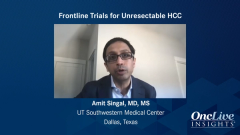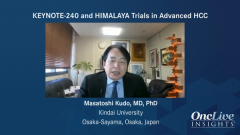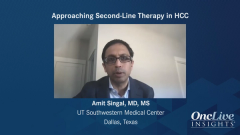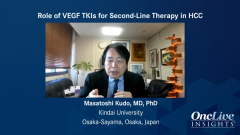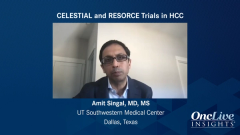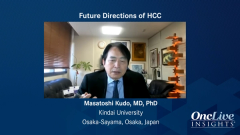
CELESTIAL and RESORCE Trials in HCC
Amit Singal, MD, comments on the use of cabozantinib in patients with Child-Pugh A and Child-Pugh B disease as well as regorafenib in advanced stage HCC (hepatocellular carcinoma).
Episodes in this series

Amit Singal, MD, MS: The CELESTIAL trial was the phase 3 study that led to the approval of cabozantinib. The CELESTIAL trial included patients who had failed sorafenib, whether this is intolerance or tumor progression, in patients who were randomized to receive cabozantinib or placebo in the second-line setting. Like the other registration trials in the second-line setting, cabozantinib led to an improvement in overall survival and overall had similar TKI [tyrosine kinase inhibitors]–expected adverse events [AEs], similar rates to what we’ve seen with the other TKIs. The CELESTIAL trial was an important phase 3 study that led to cabozantinib being another option in the second-line setting.
When we look at the CELESTIAL trial, 1 of the most interesting things is the broad patient selection that allowed you to get into the CELESTIAL trial. Not only did it evaluate patients in the second-line setting, but 27% of patients in the study evaluated patients who had received 2 prior lines of therapy. One can argue that this trial also gave data for cabozantinib in the third-line setting. This is the only agent where we have data for an agent with 2 prior lines of therapy.
When the CELESTIAL trial was published, this was a nice thing to have, but it was more of a theoretical benefit. Now, as we’ve started to see systemic therapy implemented earlier and earlier, we’ve been more aggressive with our systemic therapies. The hope is that we can increase the number of people who go through lines of therapy. Having some data in the third-line setting is an incredible benefit and utility at this point. Once again, it’s nice to have cabozantinib as another effective option in the second- and third-line settings.
The CELESTIAL trial, like other registration trials, included patients with Child-Pugh A disease, but there have been secondary analyses that have looked at patients who were started on cabozantinib, progressed to Child-Pugh B disease, and showing tolerability of cabozantinib. One can argue that these data provide early real-world data for tolerability of cabozantinib in a Child-Pugh B patient population, as well as some efficacy signal for these patients with Child-Pugh B disease.
Like many real-world data, these can’t be applied to every single Child-Pugh B patient. These are well-selected Child-Pugh B patients. But overall, if you have somebody on cabozantinib, where they progress to Child-Pugh B or are well-selected Child-Pugh B patients up front, you could consider cabozantinib as an agent in those patients. I do know that there’s a small trial that’s ongoing, where 1 of the sites, in terms of this study, is looking at cabozantinib in well-selected Child-Pugh B patients. The hope is some of these trials that are ongoing will provide even more data for cabozantinib in these Child-Pugh B patients.
The RESORCE trial was the phase 3 study that led to the approval of regorafenib, the first second-line agent approved for advanced-stage HCC [hepatocellular carcinoma]. The RESORCE trial was a trial that included patients with sorafenib tolerability but who had disease progression. The trial required patients to tolerate sorafenib at a dosage of 400 mg a day for 21 of 28 days coming into the study, and then randomized patients to regorafenib or placebo in a 2-to-1 manner in a multicenter, multinational study.
In short, what the RESORCE trial showed was that regorafenib significantly improved overall survival and significantly improved progression-free survival. One of the most notable things is that it did so in a tolerable manner. The AEs are what you would expect from a TKI, and once again with rates that were acceptable in clinical practice. Some providers were scared of regorafenib given its use in colorectal cancer and those data showing higher toxicity than one would like. There was some fear of applying this to a cirrhosis patient population. But with this careful patient selection and sorafenib tolerability, we were able to see that regorafenib is tolerable in an unresectable HCC patient population in the setting of cirrhosis and can be beneficial with improved overall survival.
The other nice thing, in terms of regorafenib, is we have data from the REFINE study, once again showing real-world data that this wasn’t true only in these very well-selected patient populations from the RESORCE trial. But you see similar AEs when you apply this to clinical practice, if not actually lower AEs because of some dose modifications and increased vigilance and experience with regorafenib. You also see similar effectiveness in terms of progression-free survival and overall survival when you apply this to clinical practice. Once again, 1 of the benefits of being the first second-line agent is that we have real-world data showing that this can be applied safely to clinical practice.
Transcript Edited for Clarity



